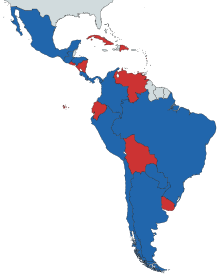Conservative wave
The conservative wave (Spanish: ola conservadora Portuguese: onda conservadora) or blue tide is a conservative political happening that started in the mid-2010s in Latin America. It was a reaction to the pink tide. The happening has been seen as declining since the late 2010s as as second pink tide has been seen happening.


Background
changeAfter 10 years of left-wing government, the influence of the left began to decrease. In Argentina the conservative Mauricio Macri took the place of the Peronist Cristina Fernández de Kirchner in 2015. In Brazil there was Dilma Rousseff, who was impeached with Michel Temer taking her job in 2016. In Peru the conservative economist (person who studies economics) Pedro Pablo Kuczynski took the job of the President before him, Ollanta Humala. In Chile, the conservative Sebastián Piñera took the job of socialist Michelle Bachelet in 2018. In 2018 Jair Bolsonaro was elected President of Brazil, and in 2021, the conservative banker Guillermo Lasso was elected President of Ecuador.
These events in Latin America are similar to other happenings around the world, such as the election of Donald Trump as President of the United States in 2016. The increase of evangelicals in Latin America may have helped start up the conservative wave.
However in late 2010 and early 2020, the elections of left-wing presidents in Chile, Honduras, Colombia, Argentina, Mexico and Peru saw a comeback of the Pink tide and the end of the Conservative wave.[1]
Presidents elected
changeBelow are right-wing and centre-right presidents who have held office in Latin America since 2010 during this wave. Centre-right presidents are marked with *.
Related pages
changeReferences
change- ↑ Dyer, Gwynne (15 June 2022). "Latin America: The Pink Tide Is Rising". The Portugal News. Retrieved 23 June 2022.